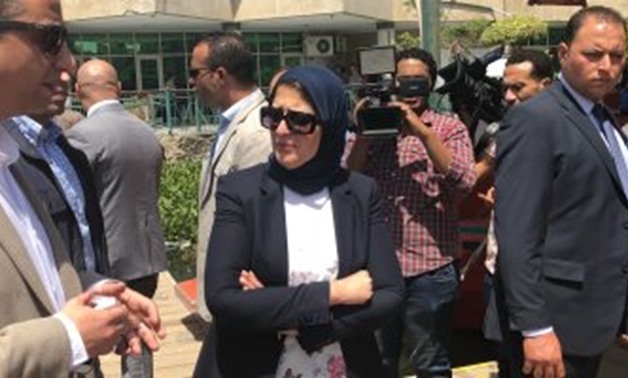
The newly appointed minister of health and population Hala Zayed – cc Egypt Today
CAIRO – 20 July 2018: President Abdel Fatah al-Sisi announced in July a league of reform measures affecting Egypt’s health sector, giving strict orders to secure national stock reserves of baby formula milk and the most important vaccines.
The health ministry, led by the newly-appointed Health Minister Hala Zayed, has consistently reiterated that the country has been lacking disposable amounts of baby formula milk and other vital vaccines for epidemic diseases, culminated in the recent spate of protests witnessed in Egypt over shortages of Penicillin vaccines.
Strategic reserves of the baby formula milk are enough for many months to come, Zayed announced on Wednesday.
In a press conference on Wednesday, Zayed confirmed that the ministry is committed to maintaining the required amounts of the baby formula milk reserves, pointing out that the ministry signed an agreement with the National Service Projects Organization (NSPO) to monthly pump one million baby formula packs into the local markets.
Since taking office in June, Zayed ordered the quick provision of the local market with large quantities of baby formula milk since the market has been suffering huge shortages of baby dairy products for so long.
Also, the government is currently working on developing a new automated system to ensure that there are no shortages in the vital medicines and vaccines in the health units and hospitals across Egypt.
CAIRO - 12 July 2018: Upon directives from President Abdel Fatah al-Sisi, the Health Ministry announced on Thursday launching the national health insurance project at a cost of LE 18.2 billion. According to the ministry, the first phase of the project will be executed in Port Said at a cost of LE 1.8 billion.
According to media outlets, Egypt’s stocks of vaccines of tetanus, meningitis and rabies and measles are available for many months to come and the ministry already included the polio vaccines for children under six months old.
For his part, head of Preventive Medicine Sector at the Ministry of Health and Population, Alaa Eid, said that the government’s strategy to make vital vaccines available is aimed at preventing the prevalence of epidemic diseases amongst children and elders.
He added that the national immunization plan ensures that vacancies are being given to 98 percent of newborns and infants.
Back in 2016, and after a major public outcry, the Armed Forces criticized what they called the “monopoly practices of the companies importing baby formula milk" and took it upon themselves to address the severe milk formula shortage by pumping locally-produced milk formula into the market at decreased prices.
In late January, former Trade Minister Tarek Kabil unveiled plans by Poland's Polfa consortium to set up a complex for baby formula production in the 10th of Ramadan city at investments of LE 600 million in the first stage.
The project is set to be financed through the Polish Development Bank, according to a statement by the ministry.
The second stage of the project will include the manufacturing of dairy products like cheese and butter, with total investments of LE 1.5 billion for the first and second stages.
Production is likely to start by the end of 2018. The project will help secure the local market's needs of baby formula with the possibility of exporting part of the output to some Arab and African countries.
Comments
Leave a Comment